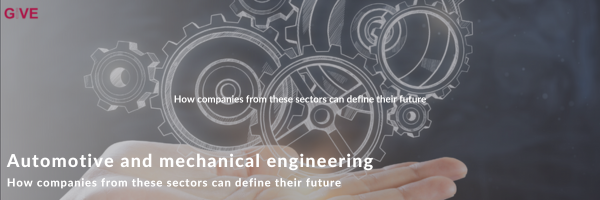
Bildnachweis: studioroman (via Canva pro)
How are automotive and mechanical engineering companies trying to define their future?
Companies in the automotive and mechanical engineering sectors are heavily dependent on the demand for their products - which in turn is influenced by consumer behavior, mobility, regulation, and technology.
To define their future, companies must therefore adapt their strategies and focus on innovation, digitalization, sustainability, and customer orientation. In doing so, they must also take into account the risks and opportunities of global markets and adapt flexibly to changes.
Changed general conditions in the automotive and mechanical engineering sectors
The omens for the automotive and mechanical engineering industries have changed considerably recently.
- The Corona pandemic has led to a collapse in demand and production stoppages, delivery bottlenecks, and uncertainty. Companies have had to rethink their business models.
- In addition, the climate crisis requires a transformation of mobility and energy supply. At the same time, however, new opportunities are opening up for alternative drives, renewable energies, and a circular economy.
- Digitalization also enables new forms of networking, automation, and data analysis. However, companies should ensure cybersecurity and pay attention to data protection.
- In addition, current geopolitics influence trade relations, competitiveness, and security.
What are the possible future scenarios?
Precise predictions cannot be made, but there are nevertheless some possible scenarios that can help companies develop sustainable strategies:
- In one possible scenario, companies from the DACH region retain their technology leadership and strong position in the global market. They offer customized new machines and services based on high quality, reliability, and innovation. They also invest in research and development to integrate new technologies such as artificial intelligence, robotics, or electromobility.
- In another scenario, tech companies worth billions from the software and internet industries are conquering key positions in the mechanical engineering and automotive markets. They offer integrated hardware, software, and service solutions based on data analysis, cloud computing, and artificial intelligence. They can use their market power and customer base to dominate the value chain and achieve high margins. Traditional companies have to adapt or cooperate in order not to be left behind.
- In a third scenario, Chinese companies are the technology pioneers. They benefit from a large domestic market, government support, and an aggressive internationalization strategy. European companies must therefore concentrate on their niche markets or cooperate with Chinese competitors.
- A scenario in which there are different developments depending on the region, segment, or product is also conceivable. For example, Europe could take a pioneering role in green mobility, while Asia retains a larger market share in conventional mobility. Or there could be greater differentiation between premium and mass products.
How stable are the supply chains after Corona?
The Corona pandemic showed how vulnerable supply chains are. Companies had to deal with disruptions, delays, and cost increases. To restabilize supply chains, companies should take a few steps:
First, they should not be too dependent on individual suppliers or regions, but should increasingly involve local or regional suppliers to shorten transport routes and avoid customs duties. They should also focus on more transparency and control within supply chains by using digital platforms, sensors, and artificial intelligence.
What role do inflation and rising interest rates play?
Inflation and rising interest rates can have both positive and negative effects on the automotive and mechanical engineering industries. On the one hand, they can lead to higher demand for capital goods as companies look to modernize or expand their facilities. On the other hand, they also cause consumers to have less purchasing power, as prices for living expenses or loans increase.
What role do high-energy prices play?
High-energy prices can also have both positive and negative effects on the automotive and mechanical engineering industries. On the one hand, they increase interest in energy-efficient or renewable solutions, which creates new business opportunities for the industry. On the other hand, they can also lead to a higher burden for production costs or transport, which reduces the margins or competitiveness of the industry.
Automotive and mechanical engineering in transition
The automotive and mechanical engineering industries face an uncertain future. Companies need to adapt to the changing environment and rethink their strategies. In doing so, they must take advantage of both the challenges and the opportunities that arise from the various trends. If you would like support in this for your own company, please feel free to contact us.




